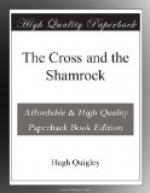“You mistake, Cynthia, my dear,” said the parson; “these are Irish, and genuine Celts, too, as one can tell from the hair and nose. I think, however, you exaggerate their beauty. Have you not read the European letters of Thurlow W—— and Horace G——, which described the middle and upper classes of the Irish as the most beautiful complexioned and dignified people in Europe or the world? Now, this is my mind, that you must get some farmers in a good Protestant neighborhood to adopt these children, so that they may all live in the same vicinity, if not in the same family; and by this means all unpleasant consequences will be obviated.”
“I say ditto to that,” said the Nestor of the council, old Valentine; “but you must lose no time, for the eldest lad told me the priest promised to call for them; and if that gentleman gets them into his hands, I’ll warrant all your plans will be frustrated.”
“That’s just it. You have hit the nail on the head, friend Valentine,” said Van Stingey. “I will take charge on them, and take them to that gentleman’s house, in W—— county, who was here last week looking for a boy and a girl to raise; and mebbee I will scare up somewhere else for the other two young critters.”
“Take ’em along, then, and see that you get your pay,” said the boss, rising.
“O, never mind, leave that to me,” said the vile, wily knave, as he went to see to his arrangements for carrying the orphans to parts unknown.
CHAPTER VII.
A RUDE LOVER OF NATURE.
Father O’Shane, who had suffered severely from the effects of exposure to the late violent storm, no sooner found himself a little recruited, and the roads passable, than he prepared to return to his residence in the city. He had, as conductor, a green young Irishman, lately arrived, who felt almost inspired by the unusual luxury, presented for the first time to his view, of a North American snowfall, and petitioned earnestly to accompany his reverence back to the city to enjoy the “glorious sport,” as he called it, of a sleigh ride. The enthusiasm of the young native of the perennial green fields of Munster did not escape the notice of Father O’Shane, who himself was once not less enthusiastic, and now not altogether insensible, to the chaste and almost sublime beauty of Nature, when arrayed in her bridal robes of white on the advent of spring.
“Well, Murty, how do you like this manner of travelling?”
“Be gonnies, your reverence, there is nothing I like better. What a fine time it would be for tracking the hare, or hunting the fox!”
“You are fond of sport, I perceive.”
“Bedad, sir, I would rather be out such a day as this, with dog and gun, than eating bread and honey. I wonder if they would put you to jail or transport you here, as they would at home, for fowling a bit in these woods?”
“No, Murty, I believe not.”




